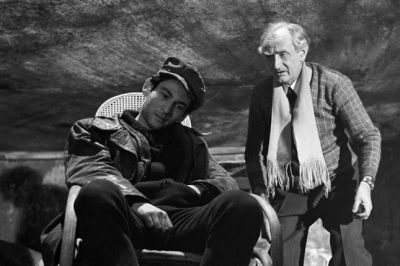
SAMSON
(Polonia/1961) R.: Andrzej Wajda. D.: 117'. V. polacca
[Sansone] Sog.: Kazimierz Brandys. Scen.: Kazimierz Brandys, Andrzej Wajda. F.: Jerzy Wójcik. M.: Janina Niedźwiecka. Scgf.: Leszek Wajda. Mus.: Tadeusz Baird. Int.: Serge Merlin (Jakub Gold), Alina Janowska (Lucyna), Elżbieta Kępińska (Kazia), Jan Ciecierski (Józef Malina), Tadeusz Bartosik (Pankrat), Władyslaw Kowalski (Fialka), Irena Netto (la madre di Jakub). Prod.: Zespół Filmowy Droga, Studio Filmowe Kadr. 35mm. D.: 117'. Bn. Versione polacca con sottotitoli inglesi / Polish version with English subtitles Da: Filmoteka Narodowa per concessione di Studio Filmowe Kadr
Capitolo essenziale nell'indagine di Andrzej Wajda sui miti degli eroi e dell'eroismo, Samson è uno dei suoi capolavori meno noti. Liquidato all'epoca come "storicamente non convincente", il film segue le vicende di un giovane ebreo, dal tumultuoso clima universitario degli anni Trenta ai ghetti della Seconda guerra mondiale. Il film mette in luce il fatto che l'antisemitismo non fu portato in Polonia dai nazisti ma traeva origine dalle preesistenti condizioni sociali del paese. Nel complesso - come osservò Bolesław Michałek - Samson è il primo film di Wajda in cui vengono specificate le cause delle dinamiche storiche e non ci si accontenta di lasciare che i personaggi vengano soffocati dalle inevitabili e disastrose conseguenze della guerra e della persecuzione. Ma soprattutto Samson è un film di guerra esistenzialista, interiorizzato. Il protagonista è predestinato a morire, come i personaggi di I dannati di Varsavia e Cenere e diamanti, ma non è questa la sua vera tragedia. La sua vera tragedia è che sembra stranamente slegato dalle lotte e dalla sofferenza del suo popolo. Diversamente da altri registi che hanno trattato il tema dell'Olocausto, Wajda non trasforma automaticamente il suo protagonista in un eroe solo perché fugge e si nasconde dai suoi persecutori. Lo rende invece consapevole del fatto che in condizioni di estrema oppressione non basta sopravvivere passivamente per giustificare la propria esistenza. Il protagonista è interpretato in modo memorabile da un attore francese alla sua prima apparizione sullo schermo, Serge Merlin, la cui fisionomia sfida lo stereotipo dell'ebreo. La sensuale fotografia di Jerzy Wójcik (Cenere e diamanti, Eroica, Madre Giovanna degli angeli, Il faraone) è fondamentale per l'intensa atmosfera del film. Le immagini di Samson che restano maggiormente impresse sono distanti dalle visioni effettistiche del ghetto create da Agnieszka Holland o Roman Polanski: a colpire qui è la neve che cade silenziosa sulle rovine, è la solitudine cosmica di un uomo nei chiaroscuri di una lotta che non sembra nemmeno la sua.
Petteri Kalliomäki
A quintessential chapter in Wajda's studies of the myths of heroes and heroism, Samson is one of his least known masterpieces. Dismissed at the time of its release as "historically unconvincing" among other things, Samson follows the path of a young Jewish man from the riotous universities of the 30s to the pressures of WWII ghettos. The film points out the fact that anti-Semitism wasn't exported to Poland by the Nazis but was already a product of the pre-war society itself. All in all - as Bolesław Michałek has pointed out - Samson is the first of Wajda's films where the causes of historical developments are specified, rather than just letting the characters suffocate inside the unavoidable and disastrous consequences of the war and persecution. But first and foremost Samson is an existentialist, internalized war movie. The protagonist is pre-destined to die - like the characters in Kanał and Ashes and Diamonds - but this is not his real tragedy. His real tragedy is that he seems to be strangely disconnected from the true battle and suffering of his people. He escapes and hides from his persecutors, but unlike many contemporary films about the Holocaust, Wajda doesn't make him automatically a hero just because of these passive actions. Instead he lets his main character face the facts little by little that under ultimate oppression surviving through passiveness is not enough to justify one's existence as a human being. The main character is memorably played by a French actor, Serge Merlin, in his first screen role, whose personal features defy any Jewish stereotypes. Jerzy Wójcik's (Ashes and Diamonds, Eroica, Mother Joan of the Angels, Faraon) sensual cinematography has a lot to do with the strong atmosphere of the final film. The pictures that are left in your mind from Samson are not the nearly exploitative images of the gore of the ghetto as presented in Polański's or Holland's contemporary accounts. Instead you remember silent pictures of snow falling down on ruins and the cosmic feeling of one man's loneliness in the shadows of a fight that doesn't even seem to be his own.
Petteri Kalliomäki

Tariffe:
Aria condizionata
Accesso disabili
Tel. 051 522285











